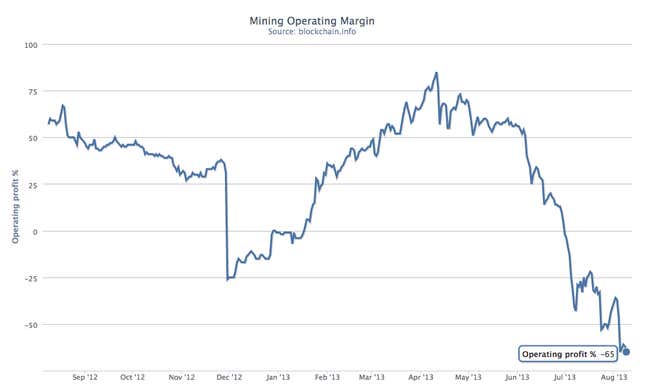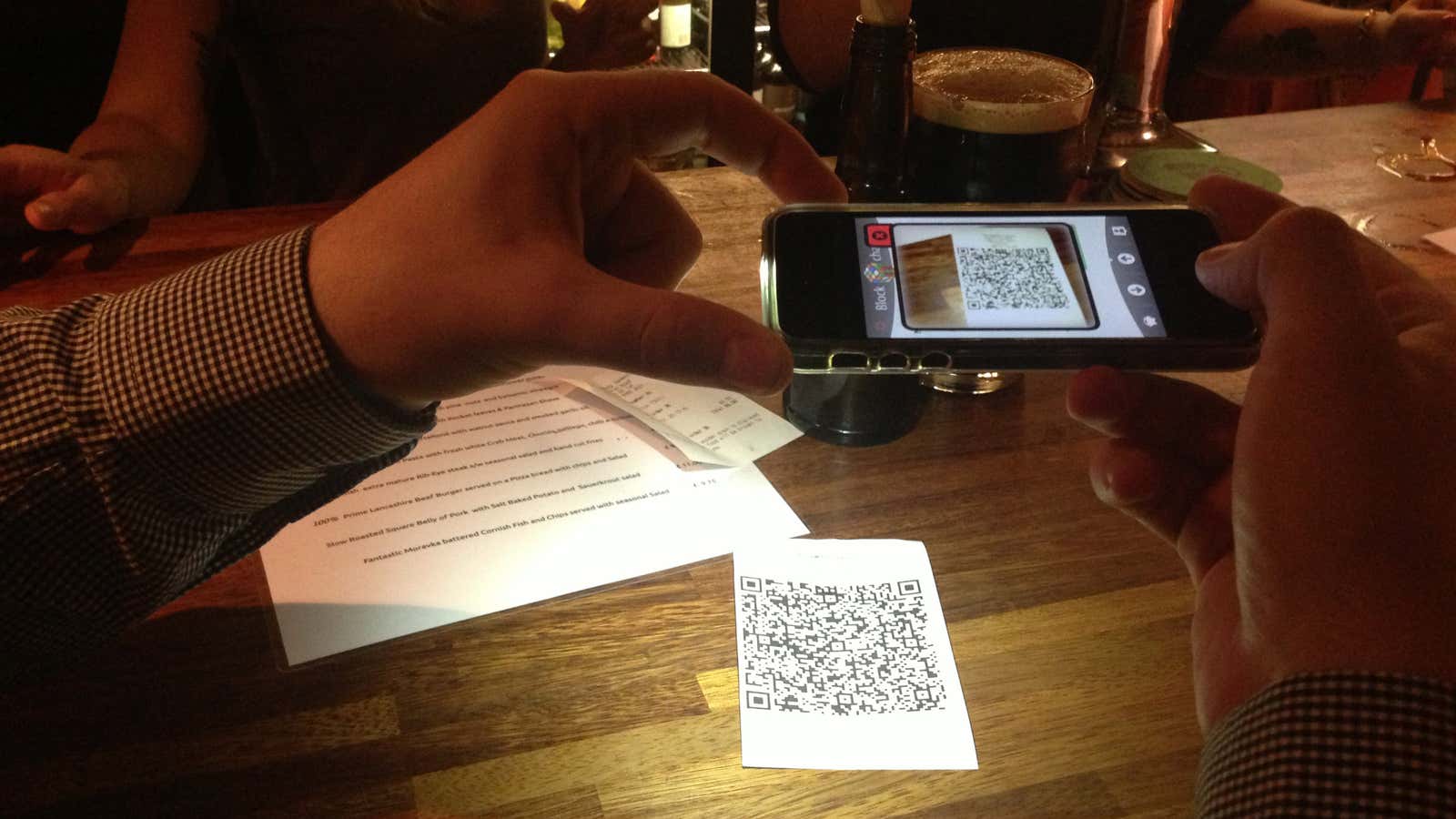The Pembury Tavern sits in a modest 19th-century building at the corner of five roads in Hackney, a relatively poor neighborhood in east London. There is little to distinguish it from the hundreds of other pubs sprinkled around the area, except for one thing: The Pembury made headlines in late June for becoming the first pub to accept bitcoins, the digital currency that earlier this year experienced a brief bubble—and a bit of fame—when it traded for over $250 to one bitcoin before quickly falling back to around $100. One evening last week, alongside an office party, scattered groups of friends and the occasional lone drinker, a disparate set of men (and one woman) gathered around a table to talk about Litecoin, a digital currency whose proponents push it as the silver to Bitcoin’s gold.
The attendees were a mixed bunch. One worked at a company that tests apps, another at a financial technology fund, and a third was a part-time Tube driver who spends his spare time trying to organize people into some sort of anarcho-libertarian movement. The convenor of the meeting, a computer-science doctoral student in London, enthused about Litecoin, which is based on Bitcoin, as the next big thing.
Both bitcoins and litecoins are essentially strings of numbers that have to be discovered, or “mined,” by using a computer to decipher codes. Once mined, they can be used as currency and exchanged with other currencies. Both are capped: There can be no more than 21 million bitcoins and 84 million litecoins in circulation. They are set up so that the more are mined, the harder it gets to mine new ones. Though more than half of all bitcoins have already been mined since its creation in 2009, it will take until 2140 for the last one to be found.
Bitcoin, the convenor said, is already is too big and increasingly difficult to mine without groups of peers to pool resources with. And those pools sometimes come under attack from rival groups, rendering a whole day’s work pointless. The returns do not justify the effort (see chart below).

But look at Litecoin, he argued. The supply remaining is greater. It is also a harder system to fool, he said, because the mechanisms that determine whether a miner really has done the mathematical calculations to generate a litecoin are more secure. Moreover, Bitcoin has reached a stage where miners are using special machines that are useless for any other purpose. Litecoin can still be made using normal computers.
Since the start of the year, the value of a litecoin has risen from $0.07 to about $2.50. And it has begun to fulfill the most important characteristic of any currency: It is winning the trust of users for transactions. ”They’re already accepting it for payments for drugs online,” the doctoral candidate explained.
An uncertain future
There lies the nub of the problem with digital currencies. Litecoin, and before it Bitcoin, first gained traction in the corners of the internet where most forms of payment will not go. In unregulated marketplaces on Tor, a software that renders its users anonymous, Bitcoin and Litecoin are preferred methods of payment for contraband goods. As a result, crypto-currencies (so called because they are created using cryptographic algorithms) have come to be associated with crime: money-laundering, tax evasion, trafficking.
No wonder governments and big firms are tetchy about its use. Last week Thailand’s central bank issued a preliminary ruling that it is illegal to to use bitcoins. Similarly, Apple has not banned Bitcoin but is extremely cautious about it. In May, the US government shut down payment providers that forwarded money on to Bitcoin exchanges. And even without government, the companies that facilitate trade in digital currencies are not helping themselves. Mt. Gox, the biggest Bitcoin exchange, finds itself facing a lawsuit for breach of contract with Coinlab, a payments company.
On the other hand, the Israel Bar Association last week made the first move towards authorizing the use of Bitcoin for payments to attorneys. In what will be a significant decision, a US judge ruled on Wednesday (Aug. 7) that for all practical purposes, Bitcoin is money. For participants in the digital-currency economy, it is hard to know what to make of these mixed messages.
Ven do we get there
The day after the pub meeting, I met another proponent of digital currencies—or digital assets, as he referred to them. Stan Stalnaker is the founder of Ven, a currency used by members of Hub Culture, a social network he also founded. It too is better than Bitcoin, Stalnaker explains over a coffee at a cafe that does not accept any form of non-cash payment except old-fashioned credit cards.
If we had met at one of the “hubs” (co-working spaces) run by Hub Culture, we would have been able to pay with ven. Members use ven to buy coffee as well as to trade goods and as non-tangible things such as time on the web service. “It’s a little bit like going to a virtual country. You arrive inside the borders of a hub and that’s the currency we use,” says Stalnaker.
One US dollar buys between eight and nine ven, depending on the exchange rate. Stalnaker says that his currency has several advantages. Its value is based on a basket of big currencies and commodities, such as gold, silver, wheat and carbon credits. That, he says, makes it more stable than the volatile Bitcoin, likening it to an exchange-traded fund. Like other digital currencies, it also allows for easy transfers across borders but without the onerous fees charged by banks and remittance companies. And since it includes carbon credits, it is environmentally friendly (if you believe carbon credits actually work).
Crypto-currencies such as Bitcoin or Litecoin are drastically different from social currencies like Ven or the now deceased Facebook Credits. The first kind promise anonymity, have no central exchange mechanism, and their mining requires technical skill and cryptography. The second class are transparent and centralized, and can be created in various ways.
Ven’s creator has big plans for it. He wants it to be used for online purchases on mobile. He sees it being traded on the open market. His brochure grandly calls it “the internet’s reserve currency.”
Mining for DATA
One way to tackle the haphazard manner in which virtual currencies are evolving is to create a self-regulatory organization. Such a body could set standards for its members (and if it grew big enough, impart legitimacy through membership); lobby for recognition with governments; and help protect the interests of the people putting their money into digital assets. It could work with tax authorities, banks and financial institutions to integrate emerging currencies into the existing financial system. Most importantly, it could help remedy the perception of new currencies as a facilitator of crime: After all, cash too is anonymous, untraceable and used for illegal purchases.
The first such effort became visible last week, with the announcement of the formation of a committee to discuss the formation of a body called the Digital Asset Transfer Authority (DATA). Its list of initial members includes exchanges (which handle transactions between digital currencies and national ones), payment mechanisms, venture capitalists, founders of yet more digital currencies such as Ripple and Ven, and the Bitcoin Foundation, a non-profit established to promote and standardize Bitcoin. (Notable for its absence is Mt. Gox, though it is represented through its membership of the Bitcoin Foundation.)
It is not surprising that these groups are setting up a “committee to establish” a self-regulatory body rather than the body itself. Considering the suspicions surrounding digital currencies in general and Bitcoin in particular, the founders of DATA need all the support they can get. There are also clear advantages to be being seen as the first to do something. If DATA manages to establish itself as the go-to body for all matters related to digital currencies, it has a chance of setting the standards and influencing laws and rules as they are written. The rush to go public is also a signal from the industry that it is willing to bring some order to the digital-asset economy before governments decide to do it themselves.
The US Treasury, and its agency for fighting money laundering, the Financial Crimes Enforcement Network (FinCEN), will be watching closely. In March, it released guidance explaining how its regulations should apply to virtual currencies. In a meeting with some of the founders of DATA soon after, it indicated it would like to see a self-regulatory body evolve from within the industry.
Two sides of the same coin
What unites the various forms of digital currency is the belief of people who hold and trade them that there is a lot of real money to be made. The PhD candidate I met at the Pembury Tavern in Hackney told me he doesn’t use Bitcoin or Litecoin to actually pay for things. Instead he spends part of his day trading the currencies for profit. Stalnaker, an entrepreneur, believes that digital currencies could be a “new asset class” to rival the rise of derivatives in the 1980s. Whether as a trader or creator, both are clearly looking to get in early enough to reap the rewards. There are thousands more like them—and 20 or more currencies for them to buy into, albeit most of them tiny, with names like Namecoin, Feathercoin, and Worldcoin. More are in the works.
The sums of money involved in creating and participating in the digital currency economy could become become enormous. At today’s exchange rate of around $100 to 1 bitcoin, there are nearly $1.2 billion worth of bitcoins in circulation—still small beer, but over ten times the value a year ago. As other currencies are invented and expand, the digital asset economy can only grow. Exchanges, user-friendly transfer systems, and funds stand to earn millions as more are created and the volume of transactions increases. Even at the most basic level, a small percentage from transactions goes to miners, who between them earned $5,000 on the basis of 55,000-odd transactions during one day this week. That number too will surely go up.
In a statement accompanying DATA’s announcement, Jeremy Liew, a partner at Lightspeed Venture Partners, which is part of DATA, stressed the need for “trust in the integrity of the companies in the ecosystem” if digital currencies are to take off. It is hard to argue with that. One reason Bitcoin so worries regulators is that it works outside the current system. If it is brought into the fold, they would rest more easy. Yet illegal activity is also where new, bottom-up currencies are coming from. Self-regulation is to be welcomed, but any body that takes on the task will have to walk a line between nurturing the nascent movement and throttling it.
